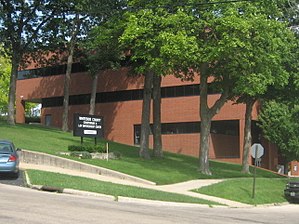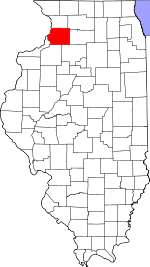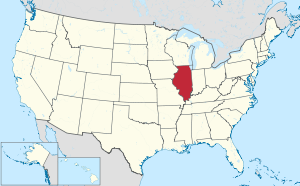Whiteside County, Illinois
Whiteside County | |
|---|---|
 Whiteside County Courthouse, Morrison | |
 Location within the U.S. state of Illinois | |
 Illinois's location within the U.S. | |
| Coordinates: 41°45′N 89°55′W / 41.75°N 89.91°W | |
| Country | |
| State | |
| Founded | 1836 |
| Named for | Samuel Whiteside |
| Seat | Morrison |
| Largest city | Sterling |
| Area | |
• Total | 697 sq mi (1,810 km2) |
| • Land | 684 sq mi (1,770 km2) |
| • Water | 12 sq mi (30 km2) 1.8% |
| Population (2020) | |
• Total | 55,691 |
• Estimate (2023) | 54,498 |
| • Density | 80/sq mi (31/km2) |
| Time zone | UTC−6 (Central) |
| • Summer (DST) | UTC−5 (CDT) |
| Congressional district | 17th |
| Website | www |
Whiteside County is a county located in the U.S. state of Illinois. According to the 2020 census, it had a population of 55,691.[1] Its county seat is Morrison.[2] The county is bounded on the west by the Mississippi River. Whiteside County comprises the Sterling, IL Micropolitan Statistical Area, which is also included in the Dixon-Sterling, IL Combined Statistical Area. U.S. President Ronald Reagan was born in 1911 in the Whiteside County community of Tampico.
History
[edit]This area was long occupied by varying cultures of Native Americans.
Whiteside County was organized by European Americans in 1836 from parts of Jo Daviess and Henry counties. It was named for General Samuel Whiteside, an Illinois officer in the War of 1812 and Black Hawk War.
Whiteside County's boundaries have remained unchanged since its creation in 1836.
Geography
[edit]According to the U.S. Census Bureau, the county has a total area of 697 square miles (1,810 km2), of which 684 square miles (1,770 km2) is land and 12 square miles (31 km2) (1.8%) is water.[3]
Climate and weather
[edit]| Morrison, Illinois | ||||||||||||||||||||||||||||||||||||||||||||||||||||||||||||
|---|---|---|---|---|---|---|---|---|---|---|---|---|---|---|---|---|---|---|---|---|---|---|---|---|---|---|---|---|---|---|---|---|---|---|---|---|---|---|---|---|---|---|---|---|---|---|---|---|---|---|---|---|---|---|---|---|---|---|---|---|
| Climate chart (explanation) | ||||||||||||||||||||||||||||||||||||||||||||||||||||||||||||
| ||||||||||||||||||||||||||||||||||||||||||||||||||||||||||||
| ||||||||||||||||||||||||||||||||||||||||||||||||||||||||||||
In recent years, average temperatures in the county seat of Morrison have ranged from a low of 10 °F (−12 °C) in January to a high of 85 °F (29 °C) in July, although a record low of −30 °F (−34 °C) was recorded in February 1905 and a record high of 112 °F (44 °C) was recorded in July 1936. Average monthly precipitation ranged from 1.51 inches (38 mm) in February to 4.69 inches (119 mm) in August.[4]
Major highways
[edit]Adjacent counties
[edit]- Carroll County (north)
- Ogle County (northeast)
- Lee County (east)
- Bureau County (southeast)
- Henry County (south)
- Rock Island County (southwest)
- Clinton County, Iowa (west)
National protected area
[edit]Demographics
[edit]| Census | Pop. | Note | %± |
|---|---|---|---|
| 1840 | 2,514 | — | |
| 1850 | 5,361 | 113.2% | |
| 1860 | 18,737 | 249.5% | |
| 1870 | 27,503 | 46.8% | |
| 1880 | 30,885 | 12.3% | |
| 1890 | 30,854 | −0.1% | |
| 1900 | 34,710 | 12.5% | |
| 1910 | 34,507 | −0.6% | |
| 1920 | 36,174 | 4.8% | |
| 1930 | 39,019 | 7.9% | |
| 1940 | 43,338 | 11.1% | |
| 1950 | 49,336 | 13.8% | |
| 1960 | 59,887 | 21.4% | |
| 1970 | 62,877 | 5.0% | |
| 1980 | 65,970 | 4.9% | |
| 1990 | 60,186 | −8.8% | |
| 2000 | 60,653 | 0.8% | |
| 2010 | 58,498 | −3.6% | |
| 2020 | 55,691 | −4.8% | |
| 2023 (est.) | 54,498 | [5] | −2.1% |
| U.S. Decennial Census[6] 1790-1960[7] 1900-1990[8] 1990-2000[9] 2010[10] | |||
As of the 2010 United States census, there were 58,498 people, 23,740 households, and 16,005 families residing in the county.[11] The population density was 85.5 inhabitants per square mile (33.0/km2). There were 25,770 housing units at an average density of 37.7 per square mile (14.6/km2).[3] The racial makeup of the county was 92.2% white, 1.3% black or African American, 0.5% Asian, 0.3% American Indian, 3.5% from other races, and 2.2% from two or more races. Those of Hispanic or Latino origin made up 11.0% of the population.[11] In terms of ancestry, 32.5% were German, 15.5% were Irish, 8.7% were Dutch, 8.6% were English, and 6.0% were American.[12]
Of the 23,740 households, 30.4% had children under the age of 18 living with them, 51.5% were married couples living together, 11.0% had a female householder with no husband present, 32.6% were non-families, and 27.7% of all households were made up of individuals. The average household size was 2.42 and the average family size was 2.92. The median age was 41.8 years.[11]
The median income for a household in the county was $45,266 and the median income for a family was $54,242. Males had a median income of $41,862 versus $29,157 for females. The per capita income for the county was $23,405. About 8.2% of families and 11.2% of the population were below the poverty line, including 17.6% of those under age 18 and 5.8% of those age 65 or over.[13]
Communities
[edit]Cities
[edit]- Fulton
- Morrison (county seat)
- Prophetstown
- Rock Falls
- Sterling
Villages
[edit]Unincorporated communities
[edit]- Agnew
- Fenton
- Galt
- Hahnaman
- Oliver
- Round Grove
- Spring Hill
- Union Grove
- Unionville
- Yeoward Addition
Census-designated place
[edit]Townships
[edit]Whiteside County is divided into these townships:
Politics
[edit]| Year | Republican | Democratic | Third party(ies) | |||
|---|---|---|---|---|---|---|
| No. | % | No. | % | No. | % | |
| 2024 | 14,898 | 56.11% | 11,012 | 41.48% | 640 | 2.41% |
| 2020 | 14,527 | 52.95% | 12,253 | 44.67% | 653 | 2.38% |
| 2016 | 12,615 | 49.31% | 11,035 | 43.14% | 1,932 | 7.55% |
| 2012 | 10,448 | 40.45% | 14,833 | 57.43% | 547 | 2.12% |
| 2008 | 10,883 | 40.32% | 15,607 | 57.82% | 504 | 1.87% |
| 2004 | 12,959 | 48.22% | 13,723 | 51.07% | 191 | 0.71% |
| 2000 | 11,252 | 45.30% | 12,886 | 51.88% | 699 | 2.81% |
| 1996 | 8,859 | 37.95% | 11,913 | 51.03% | 2,572 | 11.02% |
| 1992 | 10,146 | 37.37% | 12,329 | 45.41% | 4,678 | 17.23% |
| 1988 | 12,978 | 53.05% | 11,328 | 46.31% | 156 | 0.64% |
| 1984 | 16,743 | 59.59% | 11,226 | 39.96% | 127 | 0.45% |
| 1980 | 17,389 | 66.72% | 7,191 | 27.59% | 1,484 | 5.69% |
| 1976 | 14,308 | 55.34% | 11,255 | 43.53% | 291 | 1.13% |
| 1972 | 17,305 | 68.40% | 7,909 | 31.26% | 87 | 0.34% |
| 1968 | 15,177 | 61.86% | 8,132 | 33.15% | 1,225 | 4.99% |
| 1964 | 12,940 | 50.79% | 12,536 | 49.21% | 0 | 0.00% |
| 1960 | 17,434 | 65.56% | 9,112 | 34.27% | 46 | 0.17% |
| 1956 | 17,589 | 73.95% | 6,158 | 25.89% | 37 | 0.16% |
| 1952 | 17,294 | 73.28% | 6,238 | 26.43% | 67 | 0.28% |
| 1948 | 12,922 | 70.32% | 5,299 | 28.84% | 154 | 0.84% |
| 1944 | 14,162 | 71.21% | 5,555 | 27.93% | 171 | 0.86% |
| 1940 | 15,752 | 67.77% | 7,356 | 31.65% | 134 | 0.58% |
| 1936 | 12,666 | 59.62% | 7,982 | 37.57% | 595 | 2.80% |
| 1932 | 11,388 | 61.14% | 7,010 | 37.64% | 228 | 1.22% |
| 1928 | 13,580 | 76.60% | 4,079 | 23.01% | 69 | 0.39% |
| 1924 | 11,532 | 74.04% | 1,957 | 12.56% | 2,087 | 13.40% |
| 1920 | 10,923 | 81.74% | 1,927 | 14.42% | 513 | 3.84% |
| 1916 | 10,045 | 69.24% | 3,839 | 26.46% | 623 | 4.29% |
| 1912 | 1,437 | 18.64% | 1,996 | 25.89% | 4,278 | 55.48% |
| 1908 | 5,257 | 65.74% | 2,140 | 26.76% | 600 | 7.50% |
| 1904 | 5,636 | 71.17% | 1,546 | 19.52% | 737 | 9.31% |
| 1900 | 5,663 | 65.19% | 2,758 | 31.75% | 266 | 3.06% |
| 1896 | 5,577 | 65.43% | 2,788 | 32.71% | 159 | 1.87% |
| 1892 | 3,819 | 54.00% | 2,779 | 39.30% | 474 | 6.70% |
Whiteside County has a political history typical of Northern Illinois. Between its first election in 1840, and 1852, it always favored the Whig Party, and although Whiteside was not as strong for the Free Soil Party as counties to the east like Boone and Lake, it gave substantial votes to that party in 1848[15] and 1852[16] and became powerfully Republican for the next century-and-a-quarter. Between 1856 and 1988 the only time Whiteside County did not vote for the Republican candidate was in 1912, when the GOP was mortally divided and Whiteside County voted for Progressive Party nominee and former President Theodore Roosevelt by a 2-to-1 margin over conservative incumbent William Howard Taft. Between at least 1880 and 1960, no Democratic presidential nominee ever won 40 percent of Whiteside County's vote, and even Alf Landon in 1936 carried the county by 22 percent when losing 46 of 48 states.
In 1964 the Republican Party nominated Barry Goldwater, whose hostility to the Yankee establishment and strongly conservative policies were sufficient to leave many traditional Republicans to stay home or even to vote for Lyndon Johnson.[17] In this climate, Goldwater managed to keep the Republican Party's winning streak in Whiteside alive, but by just 1.6%, or 404 votes.
The county continued to vote comfortably more Republican than the nation for the next four elections. However, it began trending away from the GOP in 1984, as its most famous native, Ronald Reagan, successfully sought a second term. Even as Reagan increased his national margin by over 8%, his margin in Whiteside was more than halved, from a little over 40% in 1980 to 19.6% in 1984. The county was only marginally more Republican than the nation in 1984. The trend continued in 1988, as George H. W. Bush carried it by 6.8%, a somewhat smaller margin than he won the national popular vote by, making this election the first one in which Whiteside voted more Democratic than the nation in at least a century. In 1992, it gave Bill Clinton a plurality win, with a comfortable 8.0% margin over George H. W. Bush. In 1996, the county gave Bill Clinton an outright majority. The county went on to vote Democratic for the next four consecutive elections, giving Gore, Kerry, and Obama four straight majorities.
However, in 2016, concerns over long-term economic decline saw much of the Rust Belt swing heavily towards Donald Trump,[18] and Whiteside flipped from a 16.9% Obama win in 2012 to a Trump plurality in 2016. In 2020, Trump won a majority—the first for a Republican since 1988—and increased his margin from 6.2% to 8.3%.
Education
[edit]K-12 School districts include:[19]
- Bureau Valley Community Unit School District 340
- Chadwick-Milledgeville Community Unit School District 399
- Erie Community Unit School District 1
- Morrison Community Unit School District 6
- Polo Community Unit School District 222
- Prophetstown-Lyndon-Tampico Community Unit School District 3
- River Bend Community Unit District 2
- Sterling Community Unit District 5
There is one secondary school district, Rock Falls Township High School District 301.[19]
Elementary school districts include:[19]
- East Coloma-Nelson Consolidated Elementary School District 20
- Montmorency Community Consolidated School District 145
- Rock Falls Elementary School District 13
See also
[edit]- List of counties in Illinois
- National Register of Historic Places listings in Whiteside County, Illinois
References
[edit]- ^ "Whiteside County, Illinois". United States Census Bureau. Retrieved June 10, 2023.
- ^ "Find a County". National Association of Counties. Retrieved June 7, 2011.
- ^ a b "Population, Housing Units, Area, and Density: 2010 - County". United States Census Bureau. Archived from the original on February 12, 2020. Retrieved July 12, 2015.
- ^ a b "Monthly Averages for Morrison, Illinois". The Weather Channel. Retrieved January 27, 2011.
- ^ "Annual Estimates of the Resident Population for Counties: April 1, 2020 to July 1, 2023". United States Census Bureau. Retrieved April 2, 2024.
- ^ "U.S. Decennial Census". United States Census Bureau. Retrieved July 9, 2014.
- ^ "Historical Census Browser". University of Virginia Library. Retrieved July 9, 2014.
- ^ "Population of Counties by Decennial Census: 1900 to 1990". United States Census Bureau. Retrieved July 9, 2014.
- ^ "Census 2000 PHC-T-4. Ranking Tables for Counties: 1990 and 2000" (PDF). United States Census Bureau. Retrieved July 9, 2014.
- ^ "State & County QuickFacts". United States Census Bureau. Archived from the original on January 11, 2016. Retrieved July 9, 2014.
- ^ a b c "Profile of General Population and Housing Characteristics: 2010 Demographic Profile Data". United States Census Bureau. Archived from the original on February 13, 2020. Retrieved July 12, 2015.
- ^ "Selected Social Characteristics in the United States – 2006-2010 American Community Survey 5-Year Estimates". United States Census Bureau. Archived from the original on February 13, 2020. Retrieved July 12, 2015.
- ^ "Selected Economic Characteristics – 2006-2010 American Community Survey 5-Year Estimates". United States Census Bureau. Archived from the original on February 13, 2020. Retrieved July 12, 2015.
- ^ Leip, David. "Dave Leip's Atlas of U.S. Presidential Elections". uselectionatlas.org. Archived from the original on March 23, 2018.
- ^ Géoelections; Popular Vote for Martin van Buren (Free Soil) (.xlsx file for €15)
- ^ Géoelections; Popular Vote for John P. Hale (.xlsx file for €15)
- ^ Phillips, Kevin P.; The Emerging Republican Majority, pp. 61-65 ISBN 9780691163246
- ^ Lounsbury, Jud (December 16, 2016). "Pssst...Trump: You Won By Running to Clinton's Left". Progressive.org. Retrieved December 4, 2021.
- ^ a b c "2020 CENSUS - SCHOOL DISTRICT REFERENCE MAP: Whiteside County, IL" (PDF). U.S. Census Bureau. Retrieved December 13, 2024. - Text list


